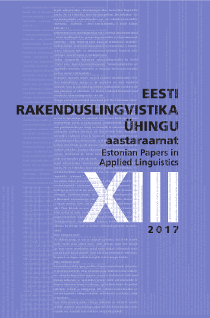Kreeka nimed eestikeelses tekstis ja kõnes
Greek names in Estonian written and oral language
Author(s): Kaarina ReinSubject(s): Anthropology, Language and Literature Studies, Finno-Ugrian studies
Published by: Eesti Rakenduslingvistika Ühing (ERÜ)
Keywords: Greek names; Ancient Greek names; Modern Greek names; onomastics; language contacts;
Summary/Abstract: The issue of how to write Greek names in Estonian has been a recurring topic in Estonia. It is not always easy to follow the transcription rules, as there is often no information on how the Greek names are actually written in Greek. Greek names are transported into Estonian mostly from other languages and thus also traditions and pronunciation rules of other languages are admitted into Estonian. Most often, such influences now originate from English.There have been different ways and traditions of rendering Ancient Greek, New Testament, Byzantine and Modern Greek names in Estonian. Rules for transcription of Greek names in Estonian are established only for Ancient and Modern Greek names. However, it is not always easy to perceive differences even between these names and their use in Estonian. Questions arise as to which rules should be used while writing e.g. Greek geographical names which have been used in antiquity and are still in use today. In addition, Modern Greek personal names and place names are rendered differently in Estonian. Moreover, problems of stress and pronunciation are sometimes difficult to solve in oral speech.The article gives a survey of the use of Greek names in Estonian written texts and oral language at the end of the 20th and in the 21st century and highlights problems in the use of these names.
Journal: Eesti Rakenduslingvistika Ühingu aastaraamat
- Issue Year: 2017
- Issue No: 13
- Page Range: 157-170
- Page Count: 14
- Language: Estonian

